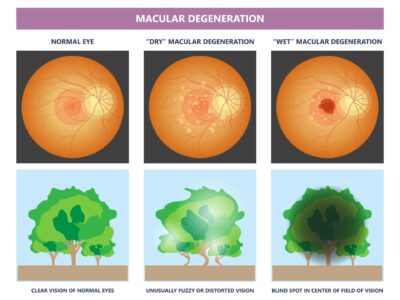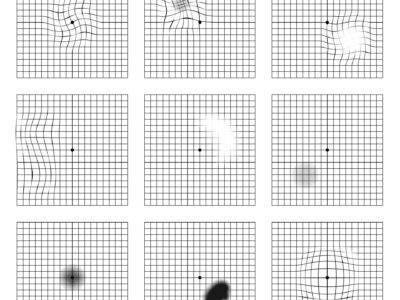Macular degeneration, or age-related macular degeneration, is a common condition where the eye’s macula deteriorates, leading to permanent vision impairment in patients. AMD can be wet or dry, but both types alter your central vision. While there is no cure for AMD, those who catch it early can undergo treatment to slow or halt its progression, saving their vision for as long as possible.
What Is the Macula?
The macula is a layer of light-sensitive tissue located in the back of the eye that plays a crucial part in vision. The macula receives light, which it then converts into nerve signals for the brain to interpret and form the images we see.
Dry Macular Degeneration
Dry AMD is the most common form of macular degeneration and occurs when the layers of the macula break down in either one or both eyes. The breakdown is age-related and tends to affect people over 50.
Dry AMD is often mild and only slightly alters a patient’s central line of vision. Most people maintain their peripheral vision, but some do experience severe dry AMD, leading to worsening vision and difficulties completing daily activities like driving, reading, and moving around safely.
Wet Macular Degeneration
Wet AMD is a less common and more severe version of macular degeneration that occurs when abnormal blood vessels form in the eye and secrete blood into the macula. Wet AMD always begins as dry AMD, but it progresses and worsens much faster than the dry type.

Symptoms of Wet and Dry AMD
Patients with wet or dry AMD experience similar symptoms. However, the symptoms of wet AMD patients tend to appear and worsen much faster than dry AMD patients:
- Distorted vision where straight lines appear bent
- Inability to see clearly, even in well-lit spaces
- Blurry vision at any distance
- Blockage or defined blind spot in your central line of vision
- Inability to adapt to dimly lit rooms
You should see a doctor immediately if you notice a change in your central vision or struggle to see fine details on objects or other people.
Even if you do not struggle with your central vision or vision clarity, if you are approaching or over 50, it is important to stay on top of your eye health and undergo macular degeneration testing. Your eye doctor can catch warning signs before you ever notice a change in your vision and can intercede with treatments to help slow or halt its progression.
What to Expect During a Macular Degeneration Test
During your eye exam, your doctor may check for signs of macular degeneration and may perform some tests to evaluate your central vision.
Eye Dilation
With your eyes dilated, your doctor will examine the internal structures of both eyes, looking for any signs of breakdown in the macula.
Amsler Grid Test

The Amsler grid is a grid of horizontal and vertical lines with a dot in the center. With one eye covered and the other focused on the dot, you will share with your doctor if the surrounding lines appear straight or bent. You will then switch eyes and repeat the process.
To complete this test at home, find an Amsler grid online and check your vision.
Visual Acuity Test
The visual acuity test involves the standard eye chart, which typically features letters that become smaller and more difficult to see with each new line. Most exams include this test, whether your doctor is concerned about AMD or not. However, the results of this test can help your doctor evaluate your eyesight and determine if you are dealing with AMD-related vision issues.
Visual Field Testing
The visual field test checks for blind spots in your central vision and helps evaluate the quality and scope of your peripheral vision. Typically, you will cover one eye and focus on a specific object with the other. Your doctor will present something in your peripheral vision and ask what the object is. You may be asked to repeat with the other eye.
Treatment and Management for Macular Degeneration
If you suffer from macular degeneration, you have several options to help manage your condition and slow its progression. Treatments can include:
Anti-Angiogenesis Drugs
Your ophthalmologist may prescribe a medication regimen of anti-angiogenesis drugs that help prevent the formation of new blood vessels and stop already formed vessels from leaking.
Laser Therapy
Laser therapy relies on high-energy laser rays to eradicate abnormal blood vessels. Your doctor may also apply a specific drug to help damage the vessels before removing them with the laser (this is called photodynamic therapy).
Healthy Changes
Your ophthalmologist may recommend changes to your health and lifestyle, including:
- Lowering blood pressure
- Losing weight
- Increasing activity
- Healthier eating habits
- Avoiding tobacco
If you suspect you are suffering from macular degeneration or would like to complete a thorough eye exam to check, rely on Vision Eye Group.
Our ophthalmologists will check your eyes and determine whether macular degeneration is a concern for you. If we detect its progression, we will begin treatment or a management plan to help salvage your vision and maintain eye health. Schedule your appointment today: 478-744-1710
Recent Articles
